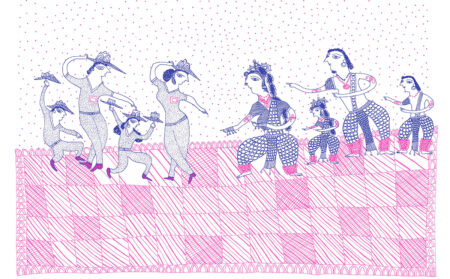The easiest thing to tell a woman in a violent marriage is to just leave. But is leaving always that simple? From financial vulnerabilities to hopes, desires, dreams, fears and responsibilities, all collide in the decision to not leave and stay.
In this snapshot of a life filled with violence, the caseworker takes us through her own samjhauta, and narrates how she carved her own space to recover a sense of self-worth. Most poignantly, she writes about how she continues to make meaning of this contradiction in their lives—of being case workers handling gender-based violence. and living with violence in their own lives.
Ultimately, she asks the eternal question: which room is mine?
The Third Eye worked with 12 caseworkers in rural and small town Uttar Pradesh, and through a process that included immersive writing, theatre-based pedagogies and year long workshops, the caseworkers became the lexicographers of The Caseworkers’ Dictionary of Violence.
Room 1:
When I got transferred from Mahoba to Fatehpur, I wondered how I would manage to stay here with my children because room rents were so high. Then I had the idea of shifting them to my sasuraal. It was only an hour away from Fatehpur. My in-laws’ house was in a poor state; still I brought my three children to this house.
That very month, there was a division of property in my sasuraal. Our share was a small house and did not have electricity. All night, mosquitoes bit us and my children just could not sleep. I was up all night, fanning them, and in the morning I went to work, tired and sleep-deprived. I discussed the situation in my office. Someone talked to the company handling our provident funds about the possibility of withdrawing money from my account. I received it within a month.
The first thing I did was to go to the Electricity Department and get a connection in my name. I also talked to people who supply materials like sand, cement, brick and started building an extension to the house. My kids helped a lot in the construction process. They are very young—my sons are 13 and 15. My daughter is 17. Whatever needed to be done, my older son did it all.
I didn’t even bother to involve my husband. Even if he did a little bit of work, he would have demanded money for liquor. Finally, when the house was complete, I felt great joy that I had built my home.
One side of the room has a cooler and an almirah, while a stack of ironed clothes occupies the other. After the plastering was complete, I stood in a corner and clicked a selfie thinking, "This is a house that I have constructed."
My children could now live properly. I got all three of them admitted to school. But they cannot focus on their studies because of that drunk. My daughter is training to be a nurse and it is so difficult for me to continue her education. Most times, she lives with her nani, my mother, and goes to her college from there. My children have many requests, some demands, which I am unable to fulfil. But when we all sit together in that room to eat, it makes me happy. They tell me, “Leave our father!” But how can I leave him? How will I raise my children if I leave that man? Even though I have built this room, the land belongs to him. So, I am not sure how much of this house actually belongs to me.
I only get to meet my children sometimes, because I also live in a rented room in Fatehpur.
Room 2:
This room has white walls and I keep my books smack next to the wall. On the wall there is a greeting card given by a friend. But my favourite part of this rented room is the terrace. Whenever I feel alone, I sit there to feel a sense of openness. Sometimes, a few friends from office also come and just hang around here with me.
I feel good living in this rented room but somewhere, I do miss my children. This room has a few belongings that hold memories for me. I look at them and they bring me joy. But, every few days, I also go back to my husband and kids. This is my samjhauta…
But when I am in this rented room, I find myself thinking of a different room. The room in my parents’ home.
Room 3:
My mother built this room. I had picked sky blue for the walls. My younger brother and I shared this room, which had with a stack of greeting cards on one side and many photo albums on the other. I kept this room well-decorated. It also had a small cupboard in which I had kept my gods and goddesses to worship.
This room was close to my heart. Every morning, the rays of the sun filtered through the roshandaan and fell on my face. Amma would cover my face with the end of her saree so I could sleep a little longer.
I was married when I was in Class 8. I was married because my father, a long-time alcoholic, had started to suffer from a mental illness. My mother had some money at the time. She was uncertain about the future and thought it best to marry me off. In her mind, there was no guarantee as to how my brothers would turn out. Some of our relatives suggested a match and Amma agreed, even though the man was much older than me and belonged to a poor family. He was also an alcoholic but no one knew that then.
The day my baraat was to arrive, I also had to appear for an exam. My palms were filled with turmeric and henna. All the boys in my school laughed at me. By the time I came back from writing my exam it was evening. My friends who had come to attend my wedding had also stayed the night. When the procession arrived, they had a look at the groom. They ran up to me and said, “Sangeeta, is this how they have dumped you? You are so young while the groom is so old.” I stood there, quiet, not saying a word. Soon it was dawn and time for me to leave, my bidaai. Everyone hugged me and cried, but my eyes were dry. At last, when my brothers hugged me and cried, it struck me that I was going away from home and then the tears just would not stop. By this time, Amma was also aware that she had pushed her young and innocent daughter into a terrible home.
And that is how I ended up leaving the room in my mother’s house. I reached my marital home, and kept telling everyone this is not my home. My brother will come, take me home, and I will never return.
Are there rooms in this world where you are handed over to someone else?
Room 4:
A very small kutcha house made of mud. You have to bend to enter the home. No lights or fans. A dim lantern light fell just in one corner of the room. The smoke from burning cow dung cakes engulfed it such that you could die coughing.
When I reached my sasuraal, it was packed with people and my face was covered in a long veil. In that tiny house, I was made to sit in a small corner. My sister-in-law sat down beside me and began to wave a hand-held fan at me.
I was so young and so thin I was struggling under the weight of the heavy saree.
I kept asking everyone, “When can I go back home?” All the women there had the same reply, “This is your home now. You have to live here forever.”
In this manner, I had to stay there for five days. My husband forced himself on me on three of those five nights. I was filled with disgust and never wanted to come back again.
When I went home, I hugged everyone and cried so much more than I had on the morning of my bidaai. Everyone consoled me. My aunts assured me that eventually everything would be fine.
Fine? I don’t know if anything became fine but I soon found myself in a room in Delhi.
Room 5:
A small room that doubled as the kitchen, and the bedroom where seven or eight people slept. Constructed in the middle of a densely populated area, this room has no space, not even for a little more air! The rent was Rs. 700. It was this room where my children were born.
I continued my education. My in-laws took me to Delhi. I became a mother the same year and gave birth to a beautiful daughter. In Delhi too, I had to stay indoors. I fell mentally ill. People would keep on telling me that I did absolutely nothing. They wanted me to go and do domestic work in people’s homes but I did not go.
Soon, it was April. It was almost time for my B.A. examinations so I came back to my mother’s house. After writing my exams, I returned to Delhi and lived there for four years. I gave tuitions to students nearby. Taking care of my children, looking after the house, and continuing with my own studies all together was really tough. We moved a lot. I do not know how many rooms we changed!
When I finally left Delhi, I had made up my mind that no matter what, I would not come back to this city. I will live and work in my village.
Room 6:
A kutcha house made of bricks, where my children and I took care of each other. The roof of this room was made of tin. I spent hours staring at it and wondered, how did I land here?
I had heard about an organisation in Mahoba and applied for a job there. After a month, I received my appointment letter. I was elated. But I was always a quiet and simple girl and scared of speaking. My colleagues assigned the nickname Chupki to me because I hardly ever spoke. Whenever I reached home late from work, my husband would say, “What kind of a job is this! Even the DM (district magistrate) does not have such long meetings.” I needed this job and I had to live with my husband, so again, I chose to stay silent.
Working in the organisation changed my way of looking at many things. I stood up against the marriage of young girls in my own area. I bought a small phone with my earnings. I worked on women’s issues. I gave courage to women and in return, that gave me courage.
My parents’ home was close to my office so I often stayed with my mother.
One day when I returned from work and sat down, my mother came to me and said, “Sangeeta, your aunt’s house is up for rent, why don’t you take it?” I was shocked.
My parents’ home, where I was staying at the moment, had three rooms that my father had built before he died. They were all taken by my brothers. After my father’s death, Amma had very little. My older brother had a shop and that is how he paid for basic needs and for the education of the two younger brothers. Amma worked in the fields. After my brothers got married, Amma slept in my eldest brother’s room. When my sisters and I go home for festivals, we have to think hard about where to sleep. Usually, we all retire to the room where badi bhabhi, the eldest daughter-in-law, sleeps. But it is a small house.
When Amma asked me to rent my chachi’s house, I spent all day at work wondering how the people in my mohalla would react. “Sangeeta’s house is so big but she is renting a house!” I returned in the evening. The following day I rented the house owned by my aunt. This house was some distance from my maternal home. Every morning, when I left my rented house to go to work, I would pass by my house and think about how it once used to be my home. I could no longer claim ownership over my parents’ home as I had done before.
The reason I lived in a rented house in the same mohalla as my parents’ home was because of my children. Amma took care of them, and this would not be possible if I lived far away. My mother too faced humiliation because of me. My brothers’ wives often told the neighbours, “She works at her daughter’s house and she is a nanny to her grandkids. She does not care for our children. She’s all about her daughter.” Whenever the aunties in my neighbourhood said this, I felt bad. I have never talked back to either of my sisters-in-law. If they say something, I just listen quietly.
After a year, I changed rooms again. This room was near the main road and a little far from the previous one because I wanted to avoid walking through the same street. Later, when I got posted out and, as I mentioned earlier, I sent the kids to the house my husband inherited, where I added a room for them with my money. Visits to my maika became less frequent.
At work, I never expressed the stress I was feeling. Even when there were quarrels with my husband, I never told anyone. Whenever after a fight I tell him that I want to leave the house, he says, “Go, take your room and go away. The land is still mine.”
How can one take their room and move out of the house?
My colleagues and friends from work often come over to my Fatehpur room to spend time; but slowly, they are all moving away from the city. I find myself alone on the rooftop.
Yet one can never see a hint of tension reflected on my face. I am always smiling. At the office, they say, “Sangeeta has such a smiling face.”
Perhaps, this is my bargain…
Translated from the Hindi by Mini Sinha with inputs from the TTE team.





